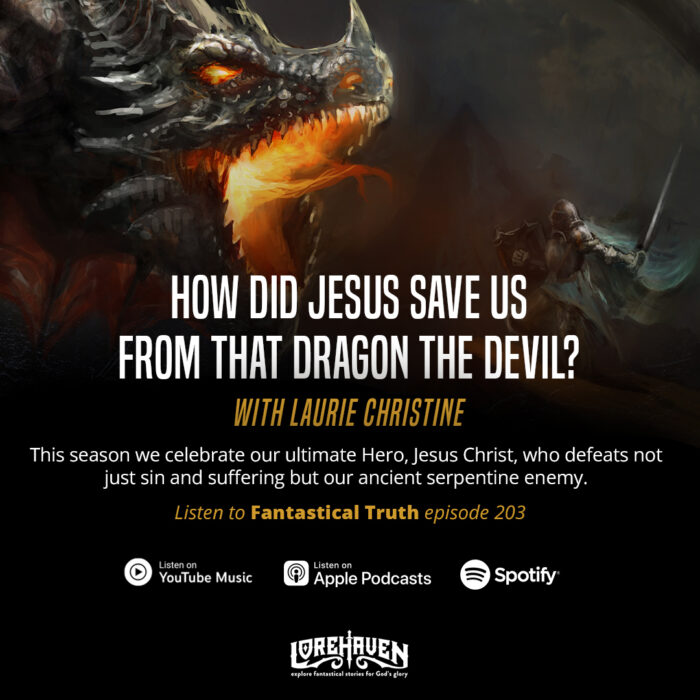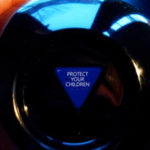Does the ‘Captain Marvel’ Film Promote Feminism?
After I saw Captain Marvel, I read two contradictory Christian reviews—both from writers I follow and respect.
The first was the opposition from Greg Morse at Desiring God. Next came some very high praise from K. B. Hoyle at Christ and Pop Culture.
Morse at Desiring God argued the movie could show a stronger-than-all woman swooping in to save the failing men, when all hope is lost in the battle with Thanos. He suggested this could encourage men in our society to remain weak, passive, and cowardly in their God-given role as a protector.
(Beware Avengers: Endgame spoiler here: I’m glad that Captain Marvel didn’t end up being the savior in Avengers: Endgame, although I would agree that, before the film released, many fans expected she would be.)
By contrast, Hoyle at Christ and Pop Culture felt female superheroes are necessary to encourage women to have agency, and to drive back the culture of misogyny still much alive in America.
I bring only these two opinions to front because they likely represent how the Church is responding to this film. Both of these writers contributed wisdom to this ongoing discussion on feminism within our society, and, more specifically, Christianity. Yet there are a few important things to note about both of these perspectives when deciding where to land.
1. They’re addressing different audiences.
We all see feminism in different ways, depending on our own connection or experience with feminism. But we often attack weaknesses within our own subculture without regard to others in different parts of the country (or world).
Morse is speaking to the wider, secular culture living under extreme forms of feminism. For example, see the kind of feminism that advocates for killing babies. Meanwhile, Hoyle is addressing the culture living among misogyny, such as alt-right areas and fundamentalist Christianity (which, admittedly, are far more pervasive beliefs than we previously thought).
Which side should be addressed? Both, because they are both wrong and contrary to the gospel.
2. They’re overstating their point.
In only addressing one side of a problem, we tend to place blinders on and fail to moderate ourselves when necessary.
As Hoyle points out well, Morse is (perhaps unintentionally) giving the impression that women should sit on the sidelines and wait for a man to come along and protect her. Not only is that not biblical, it’s not even practical. What if she happens to be alone, an unmarried woman, or even a single mom? What should she do? Meanwhile, Hoyle implies a rather low view (again, unintentionally?) of the roles of a male protector and a female helper within complementarian theology (which I can’t tell if she believes or not).
3. They are not nuanced enough.
Whether we like it or not, this is an ethical discussion, and ethics requires nuance.
For example, we can say God hates divorce but we can’t pass judgement on a divorced person without knowing the exact details of their situation. Is Captain Marvel someone to emulate? This is not a yes or no answer. We must be able to dissect the film and character and admit that Danvers is only an appropriate role model in some ways.
The same is true of any other superhero. Secular films, while attempting to address important cultural issues, will only be able to accomplish that in part (often with a great, big helping of secular propaganda).
In making a stand for the importance of pop culture and fiction, we must be careful not to imply that they are wholly good. They can’t be. Apart from Christ, humans will only ever be able to produce a shadow of the truth. It isn’t our job as culture aficionados simply to get people to watch geeky movies and read geeky books, but to get them to both appreciate and think critically about these things. When we feel compelled due to recent cultural shifts to make blanket statements without proper nuance (i.e. “This movie is good and/or bad because feminism.”), we cut off at the knee our ability to think critically.
So where is the biblical balance about women in battle?
Let’s take a look at Deborah and Jael as an example of biblical, feminist icons. You may have heard female superheroes described as Deborah-types, but how true is that? Judges 4 describes the ultra-godly and wise Deborah judging Israel. Barak goes to her, and she calls him out about not going into the battle God ordered him to. Then Barak tells her he’ll go, but only if she goes with him. Deborah answers, “I will surely go with you. Nevertheless, the road on which you are going will not lead to your glory, for the Lord will sell Sisera into the hand of a woman” (Judges 4:9).
The woman she’s referring to is Jael (verse 17), who tricks Sisera, commander of the Canaan army, into her tent. Sisera, thinking he was safely hidden, falls asleep and Jael hammers a tent peg through his temple.
Judges can be difficult to interpret, since it is written in mere descriptive, factual accounts without moral commentary. What we don’t actually see is Deborah fighting. She went with him, but whether or not she was swinging a blade on the front lines of war, we can’t know for sure—although I doubt it. What we do know is that she is condemning Barak’s request. This likely means she knows Barak is being cowardly by asking her to go, and that he is using her as a good luck charm to win the battle. Because of these errors, cunning Jael will be remembered for defeating Sisera, not Barak.
Is this passage encouraging women to fight in war? That’s a stretch. In fact, the opposite seems to be true. Deborah points out Barak’s cowardice in not having enough faith to go into battle without her by saying the glory will not go to him. When we compare this with Jael’s strength, depicted here as crafty and intelligent, we hardly see Scripture advocating women being included in combat units.
Instead it seems to be giving a beautiful image of what a true female helper looks like. The word helper in Genesis 2:18 often gives us visions of piles of clean laundry and dirty dishes. That is nowhere near accurate. In fact, the same word is used more often in the Bible to describe God himself. Women as helpers is not a subordinate role, but an equal, essential one. And in the case of the battle in Judges 4, it meant life or death.

So does the Bible imply a prohibition to female superheroes? Not at all. Like K. B. Hoyle said so well, “They must know they can be agents of change—that their voices are as loud and as true, their strength and dedication just as valued and valuable, as their male counterparts.” Amen!
My father, a black belt in kung fu, drilled women’s self-defense into me as a child knowing the world we live in is not safe and that he wouldn’t always be there to protect me. We absolutely can have strong, female superheroes in our stories who embody real femininity and complement their male counterparts.
But should those heroes be on the front lines of war? Believe it not, that is an entirely different question and one of the biggest reasons we need more nuance in order to have this conversation. From what I’m seeing in scripture, not in most cases. (Although there may be extenuating circumstances in which this may not be avoidable depending on the demands of the story.)
Since women fighting in war, and possibly even being drafted into combat units, is a reality of our often extreme feminist society, I would have to agree with Morse that this is not something to be encouraged. His concern that this could lead to weaker and more passive men is not unfounded. Barak’s cowardice is as old as Adam’s sin in the garden, and we still see it today.
Last but not least, Hoyle brings up another crucial aspect of this discussion at the very end of her article: that this is fantasy. Superpowers are a type of magic system, and therefore, throw a bit of a wrench into our applying these things to ourselves. Because Captain Marvel is actually stronger and not weaker than her male counterparts, doesn’t it follow that she should be fighting on the front lines?
This is a big question that creates many more. Just remember that most of the time when reading or writing about fictional magic, we’re using unreality to shed light on reality (whether we know it or not). Is Captain Marvel’s extreme physical strength a mere metaphor for her intelligence? Some viewers may have seen it that way. But to the woman who, like Eve before her, is looking to usurp the role given to the passive man standing next to her, that is not what Captain Marvel meant.
Let us not make blanket statements for one another, but see a thing for what it is, both the good mixed with the bad. We all have different origin stories that color our view of films and books. Although we shouldn’t espouse moral relativism, we need enough intellectual humility to listen to the perspectives of others and understand how things might not be as they first appear.








































I mostly agree. I haven’t seen Captain Marvel yet, so I don’t know what I think of the show itself, but it seems like it’s partly going to be judged based on the controversy surrounding it.
But, yes, evaluating these things takes a lot of nuance. One thing for me is that when people set out to make a feminist icon in mainstream media just for the sake of it, the char carries a large risk of coming out so so at best. That can be a bit insulting. (I’m supposed to look up to/identify with THIS?)
Some of the best female chars I’ve seen are ones that are just themselves, and do a better job of representing women even without being written for the sake of feminism. Lots of anime chars are like this. Like…Natalia from Fate Zero probably had around two episodes of screen time at the most, and it didn’t really go into her backstory(those episodes were about Kiritsugu). But she was strong and cool and her story as Kiritsugu’s mentor/mother figure was tragic and touching. She was keenly aware that she wasn’t the perfect person to raise him, but she sure tried her best. Also, Kiritsugu was an amazing assassin, and Natalia taught him everything she knew and was never sidelined during the process. Kiritsugu is pretty much a living testament to Natalia’s skill.
It feels kind of weird for people to act like Captain Marvel and other such chars are the ones women ‘need’. Maybe fifty years ago she would have been better than nothing, and maybe she isn’t a horrible character, but she probably isn’t an amazing or revolutionary one, so it’s odd for people to act like she is or supposed to be.
Honestly, there have been a lot of guy chars that I’ve ‘needed’, or at least identified with, a lot more than the female ones. And that is because their personalities and struggles resonated with me a lot more. That’s not to say that there shouldn’t be strong female chars, because they definitely should be there. But I don’t like it when people make a cardboard cutout feminist char and then uphold it as someone everyone needs to like and root for. Especially when there’s a subtle message that says ‘this is exactly how all women think, feel and maybe should behave’.
Complementarianism = patriarchy with a insufficient coat of whitewash on it.
If men become weak when women are more proactive, it’s because those men are sad sacks of dick.
Okay, that’s a bit mean (or a lot mean, but is it untrue?), but it’s the same reaction I have for manbabies who act like their weeners will fall off if they wash a dish or do their own laundry. Yeah, it’s upsetting when you have to do this thing you didn’t expect to have to learn or want to do, but guess what, cupcakes, the definition of a functional adult is someone who can learn and adapt to these kinds of situations. If you want to pay someone to do it for you, that’s a workable solution, but don’t pretend like domestic labor isn’t labor. Pay the eff up.
Yeah. People need to learn to be adults, though I wouldn’t only blame complementarianism, especially since there’s different forms of it.
People kind of also underestimate the human need to be active/have aspirations in life. Some men might not rise to the occasion/fight if they see women fighting, but most of them won’t factor that into their decisions much. People often do things because they want to, not necessarily because they’re easy.
Or, men could even be encouraged to fight by the women in their lives (think about guys who were raised by strong single mothers or something). And regardless of how many women become soldiers and cops and whatnot, there are still going to be men that take an interest in that stuff and sign up.
While I have waged rhetorical war when I thought it was important (which may have been far more often than when it really was important) I think the use of insults is generally bad. If you would not want a woman to be called cupcakes, don’t call a man that. I don’t think treating people badly is the real road to equality.
“Cupcakes” is something that a TV drill instructor would use because they can’t drop f-bombs onscreen. “Cupcake” is on the low end of insults thrown around the internet.
But it’s rather unrealistic to pretend like people who have to put up with clueless dudes are going to have infinite patience about it. Clueless dudes have often traded on their cluelessness to manipulate their way out of doing emotional labor.
Let’s cut to the heart of the matter instead of focusing on particular words. You believe in “punching up,” a modern notion linked to social justice concepts in which groups afforded with privilege are fair game for (verbal) attack, especially from groups with less privilege. Just because of who they are, but doubly so (or more) if they misbehave.
I believe in an ancient notion often called the Golden Rule, which the Bible phrases as “love your neighbor as yourself.” I believe that even though it’s necessary to combat certain actions (and words), while doing so we should avoid, as much as humanly possible, being sarcastic or insulting about it.
It does not matter to me so much what results the Golden Rule produces, since I’m looking at it as a duty (deontological) rather than a means to an end (teleological). Yet I think routine attacks on other groups as in “punching up” invites counterpunching and raises tensions. I think leading with kindness is generally better.
That’s what I was trying to express in regard to your tone. Yes, I agree many men need to grow up. I just think it’s better to say so kindly if possible.
That’s nice, I guess, but I’m feeling this like at my retail job when we get another email from middle management telling us to smile more. I’m not taking their opinion very seriously when they don’t have to deal with the brunt of the reality.
Um… or maybe you’re ignoring the brunt of the reality that you need to be friendly to do a good job in retail.
I appreciate your balanced approach here. Yes, there are many topics concerning which being too extreme either way is a mistake and the proper relationship between men and women is one of them.
I think the excess that would concern me in the direction of feminism would be to imply all women are in fact superior to all men by every meaningful metric. Captain Marvel (which I haven’t seen), could perhaps be viewed as saying that /because/ she is a woman, she is the stongest. Which of course would not make sense, but I think is a belief some feminists hold whether they say so openly or not (female superiority).
I think a real concern in storytelling stems from a level of ire about women being portrayed as weaker than men (in any sense) by some feminists. Which may lead to a push to have women characters without any vulnerabilities. And people without any vulnerabilities tend to be at least a little boring.
Part of the problem with our culture is we come from ancient warrior traditions that still shape our world view. Often in the stories that permeate our culture, the power to physically fight is treated as inherently more important than the power to show kindness and build someone up. But it isn’t.
As Christians, while we are inheritors of an Old Testament that shows an active warrior culture and even shows that God can be a warrior (and even our humble Christ will return with an army of heaven), we know, or should know, that war is aberrant. In sharp contrast to an evolutionary perspective, which puts a fight for survival as the driving engine of the process that created all life, we know God is capable of creating without a battle. We know our world is full of conflict, but that’s because we inhabit a cursed universe, a universe cursed because of sin.
Likewise, while war is a real necessity, it is a necessity because of human evil that forces otherwise kind-hearted people to take up arms in defense of those who are weak. Neither men nor women were intended to be at war in God’s original plan. Yet sometimes each gender is forced to fight.
Did God create men and women different from one another? Clearly yes. The most obvious difference–no man can ever bear a child.
Are men on average better than women at war? Let’s see: men are generally physically stronger, can pee standing up (this is an real advantage in harsh combat environments), don’t need menstrual supplies, and can’t get pregnant (being pregnant is of course a liability for any extreme physical activity). Men are also somewhat more expendable, because a society can survive better with a higher ratio of women to men rather than the other way around. Yep, in general, men are better suited for war.
Yet there are exceptions to that. Some women are exceptionally couageous, clever, physically fit. Some women are great shooters and some are great pilots. Some are great strategists. I see no reason to deny women able to fight the right to fight. But keep in mind that war sucks, so going off to battle is hardly a privilege.
I personally would appreciate more superhero stories that emphasize strength other than physical strength…